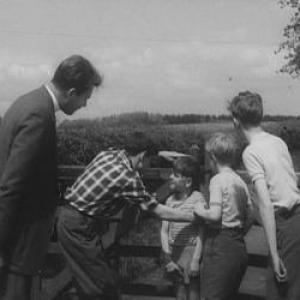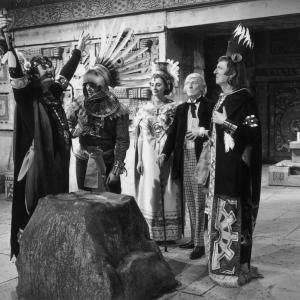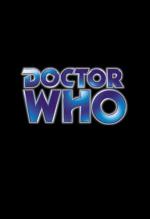| # | Quote |
|---|
| 1 | Jacqueline Hill and I both came to the same decision (to leave) at about the same time, and we gave Verity plenty of notice. I think it twas her plan to write us out together, although that was obviously the most logical, neat way to do it. My memory is a little blurry as to how they actually disposed of us, although I do remember being taken all around London's sights for the closing shots. Actually, Verity and Billy between them tried very hard to keep us on but that was it, we'd done two years. I had to go, because the whole Doctor Who (1963) job was turning into a grind, the spark had gone out of it for us, and I wasn't inspired enough to put all I felt I should do into it. What we started in Doctor Who (1963) is not so very surprising when you consider the talent of someone like Verity Lambert, or the impact that Billy made with audiences everywhere." |
| 2 | I liked 'Marco Polo' and I think that was extremely well-written, exciting and diverting as well as having a bit of history on the educational side. I was actually behind one of the stories, as we had a lot of contact with Verity and David and we knew they were always on the look out for stories and ideas, so I suggested the idea of doing a serial set in the French Revolution, which, lo and behold, became a reality. The historical stories were always fun, because it gave us the opportunity to dress up and really enter the period. I remember doing 'The Romans', which was fun, and another about Richard the Lionheart (The Crusade), in which the director wanted me to let my arm get covered in ants - I said 'Under no circumstances', and that was that, they had to get a stand-in. |
| 3 | Maureen O'Brien joined us, and I have to say we didn't like Carole having left, so Maureen was faced with a very difficult job at first. But she was and is a most accomplished actress, so she managed the change-over very well. She was a lot more down-to-earth than Carole was, but they were trying to ring the changes, which was a good thing for the series, a necesary one. |
| 4 | With 'Planet of the Giants', they got very ambitious and literally filled the studio with as many of these outsize props as they could fit in, including a giant telephone and a box of matches. The matches themselves were rather dangerous as they were bulky and could bump you on the head if you dislodged them. We used a process called back projection, where we were placed against a giant screen onto which was projected film of this cat trying to turn us into his lunch. That was another fun one which we enjoyed doing. |
| 5 | I have to confess that the Daleks took time to grow on us, and we weren't especially taken with them when they were first unveiled. But they were very effective on screen - my daughter was absolutely terrified by them. You needed a lot of ingenuity to work with the Daleks and it helped if you got on with the men who pushed them around from inside. It all came back to the business of taking the fantasy situation with the utmost seriousness, so that the right mood would be conveyed to the audience. The Daleks provided me with the first indication that our programme was going to be really successful. I bought a copy of the Evening Standard one day and inside there was a cartoon showing General de Gaulle as a Dalek. And that was that. |
| 6 | I think we were all aware that once the series had established itself, it would run for some time, but I don't think we were ever intending to see it through to the end regardless. Carole (Ann Ford) was a young actress who, understandably, wanted to do other things, and so we were sad but not especially surprised when she left us. I think Billy felt it the most - he was certainly very annoyed with Jackie and me for throwing the towel in, and I heard that he didn't like being without the original line-up at all, especially as Verity left too. |
| 7 | We actually filmed the first episode twice, because Sydney Newman looked at our first efforts and simply said 'Do it again'. Sydney was the boss and the series was his baby. We all knew that, and we all knew we were on the line. Verity and her team were working themselves into the ground and we, the actors, liked to think we weren't letting the side down. In those days it certainly wasn't glamorous - we rehearsed anywhere and everywhere, so long as it was near the BBC's Shepherd Bush premises, and that often meant we'd be freezing to death in a church hall somewhere. I remember one place where the roof was leaking and we had to put buckets out to catch all the rainwater. |
| 8 | "An Unearthly Child" was a very weird set-up - they took us right the way back to the Bronze Age, or somewhere around then, and the script was all about these cave people. They had to talk virtually in grunts, which made the whole thing almost impossible to rehearse. Once in the studio - that was one thing - but out in rehearsal, with all the actors and actresses in their ordinary clothes, it just fell apart because it sounded too funny for words. We collapsed all through the week, which is perhaps the reason why we played it extra serious in the recording. |
| 9 | We would have a week's rehearsing for each episode and on the Friday before the next day's studio recording, Verity and Mervyn Pinfield, and David Whitaker, would all come along to see what was going before the cameras the next day. There was a lot of collusion in the first weeks and a fair amount of committee-writing. Certainly, Verity and David were on hand more often than was later the case. |
| 10 | Billy (Hartnell) was especially thorough in working out his character and the way he would relate to the rest of us. He worked as a great professional, ironing out the smallest of details and embellishing where possible. He tried to understand the TARDIS as far as he could and he devised a way of operating all the switches to keep continuity. He thought of little touches, like always getting my name wrong, and he was keen to develop a kind of protective friendship with Barbara, coupled with a rivalry between the Doctor and Ian. |
| 11 | I don't think we ever meant to convey anything more than a close friendship (between Ian and Barbara). That was there in the first story, but it was more guarded. The situation which the teachers found themselves in naturally drew them closer together. I don't think there was ever any idea that they might be in love or falling in love or anything like that. Jackie and I made it our business at the beginning to work out very carefully how we would fit into it and how long it would take before we got used to the life on offer. I'd hate to just get the script and have to do it without that process of developing the interpretation - that's what being an actor is all about. I was lucky with our second script editor, Dennis Spooner, who was very sympathetic to actors and would instruct his writers well, telling them what was out of character. |
| 12 | I think Verity Lambert wanted someone who could not only play the part as she envisaged it, but who was also used to the pressures of live television and long production schedules. I had both on my side, because although most live serials didn't last longer than three months, I'd been in filmed series with production going on for nearly a year. There was a certain type of stamina needed in those days - a lot of nerves to deal with that rush of adrenalin before a live or semi-live performance. It was much more rewarding, and much more like being in the theatre, and it gave a show an edge which recorded drama lacks. |
| 13 | Getting back to Doctor Who (1963), I was contacted by Verity who said she wanted to meet to discuss a part in a new serial she was doing. I went along to talk to her about it and got myself into a lengthy discussion about the series, what it was about, what my character was supposed to be doing in the whole set-up and roughly what the other details about it were - how long the engagement would be, etc. Eventually, all was agreed and I signed my contract, which was interesting as the BBC had an escape clause whereby had the series been a flop they could have dropped us at any time, whereas we were bound to keep to our side of the bargain. I have to admit that none of us thought that Doctor Who (1963) would be around for a very long time, except Billy Hartnell, who had the kind of confidence in the project that the star needs to have. |
| 14 | I remember meeting Bill, Jackie and Carole Ann for the first time and being very impressed with Billy. I was well aware of his track record in British films, as I had been a part of that industry myself, making about a dozen up to the time I did Doctor Who (1963). But Billy was a super actor, adept at playing tough parts and famous for his marvellous performance in a film called The Way Ahead (1944), directed by Carol Reed. I hadn't met the two girls before, but after the first nerves we got on famously. The BBC couldn't afford to have large casts, so most of the dialogue and action fell on our shoulders. It made us a close bunch. |
| 15 | I'm very proud to be a member of the RSC. It's something in which I believe. It's very easy for people to attack it, saying it doesn't earn its keep, but the service it provides is wonderful and worth every penny. It has a huge turnover in plays and entertains a great many people. It bring the theatre to so many people who wouldn't ordinarily be interested in plays. 'A Clockwork Orange' sold out after only three days, and is appealing to a much younger audience. We've tried to be innovative with it, and keep faithful to the book while making it as exciting as possible. Most people remember the film but that's a different medium. I can remember the shock and the controversy surrounding the violence in the film. Today, people don't seem to be shocked by the violence in the play. I think that's an indication of how society has become accustomed to violence on the screen. |
| 16 | Doctor Who (1963) had a very positive effect for me, really, because it was a very successful programme and I enjoyed doing it very much. Anything that gets your name around can't be too bad. I'm lucky in my work, because I flip between television, film and theatre, so I don't, in a sense, capitalise on anything I've done on screen. I seem to do a few years of nothing but television, and then I go back to the theatre. |
| 17 | Doing Doctor Who (1963) didn't really affect our lives that much at the time. We all got up early, drove into London and rehearsed and then went home; life went on, and we didn't have much time to attend fetes, although I did do a few public appearances. I finished the show and then went on to do something else. At the time, we used to get requests for photos; nowadays, people send me great lists of questions which I can't answer because I really can't recall the show in that much detail. I do wonder what else there is to say about it all. I enjoyed attending the one convention I've been to, and I have been invited to others, but there's very little I feel I can contribute. |
| 18 | After three years, I think I was getting into the nine to five mentality of it all, and I needed a change. Jacqueline Hill and I left together, and Billy was absolutely furious. We heard stories that he wasn't really happy with the show after we left, and Verity left soon after that as well. Sadly, I never saw Billy again after leaving the show. We all kept in touch by letters and the occasional Christmas card, but we never actually saw each other again. I have seen Jackie from time to time but Verity became more of a close friend of mine. I hadn't seen Carole until a Doctor Who (1963) convention a few years ago. |
| 19 | We didn't like Carole Ann Ford leaving at all, but we got used to it. In the theatre, people leave all the time and it's not such a turmoil, you feel they are going on to another job, that's all. Maureen O'Brien came in and she was a good actress, but she was very different to Carole. I didn't find her as 'unearthly' as Carole was, as regards to looks. I think Maureen looked a more ordinary sort of girl. Out of all the assistants I've seen, I think Carole was the only one to have that strange, unearthly quality about her. |
| 20 | I thought the convention was all rather strange and I must admit I found it curious, to have such a passion for something I'd done so many years ago, but I soon discovered the fans are as sane as anyone else. It's strange to me, because my life has moved on and I'm constantly doing other things. I often find myself at a loss of what to say to people, because they know more about the programme than I do. I'm astonished and very flattered. Even now, people still write to me saying they enjoyed the show very much, and asking for a signed photo. If you think about it, a lot of people are seeing it for the first time and so it has the same effect on them as it did all those years ago. It's very wonderful to have played a part in that. |
| 21 | I remember 'Marco Polo' going on for quite a long while, and being under quite a lot of pressure. Despite that, we all enjoyed it tremendously - in fact, we rather enjoyed all the historical stories. Dressing up in the appropriate costumes was always great fun and it looked very splendid. The script was very good, and that contributed to the all-round enjoyment; it concentrated more on the characters, their development and the narrative and so, I think, the story was told in a believable way. |
| 22 | After The Adventures of Sir Lancelot (1956), I had a marvellous offer from the BBC to star in 'Nicholas Nickleby' in a great twenty-week series. Then I was offered _David Copperfield_', which was still live at Lime Grove, followed by Doctor Who (1963). Verity Lambert got in touch with me and after various conversations, I went along to meet the rest of the cast. |
| 23 | We were pushed around a lot sometimes. One of the things we'd always argue about on the studio floor was that certain writers were making us say things that we felt our characters would not say. Eventually we got a script editor, Dennis Spooner, who co-ordinated with the writers and kept an eye on things. We liked to talk a lot about how our characters would develop. |
| 24 | We formed a very happy little group. I was very impressed with Billy (Hartnell), he was a true professional. He had all the switches in the TARDIS marked out exactly in his mind. He had the idea of the Doctor always getting my name wrong. Billy wasn't at all like the Doctor off set, he was just a very professional actor who did his job in his own way. |
| 25 | Acting was something I enjoyed doing as a young boy. I found myself drawn towards it. I kept it up when was in the Air Force and organised entertainments for other people. Then, after I left university, I went into rep and continued from there. I think I was rather typecast at first as the dashing young lieutenant or RAF officer, who always seemed to get killed. |
 $1.4 Million
$1.4 Million




